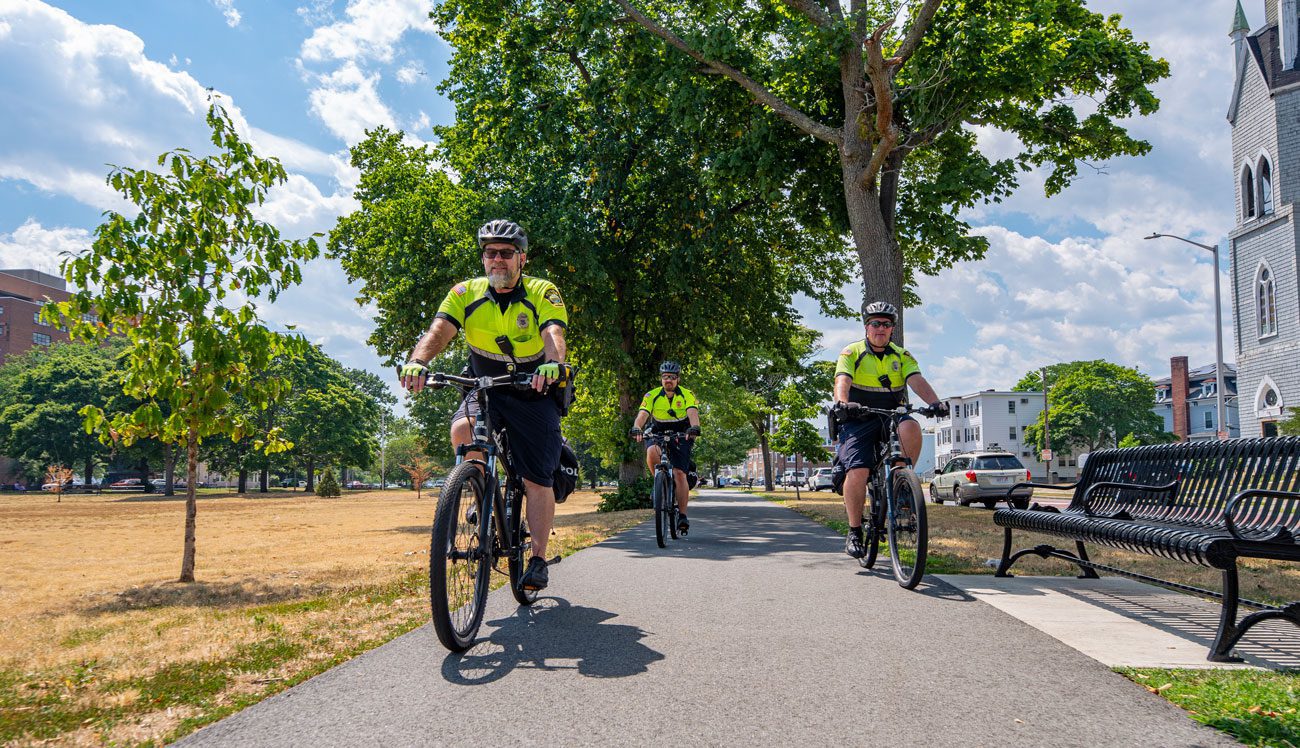LYNN — The Lynn Police Department’s Bike Patrol Team is not your average law enforcement team. They are on the streets, bringing resources and support directly to the community.
The team began in March 2020, but it was immediately halted by the pandemic. Later that year in June, the team finally ramped back up. The behavioral health unit’s case manager, Shyra Broughton works with “the bikes” and said their efforts during the height of the pandemic were crucial, especially for the city’s homeless population.
The goal of the bike team, as described by Sgt. Rick Connick, Officer John Morley, and Officer Tom Mackin, is to make connections with people in the Central Business District of Lynn and get them the resources they need, whether that be food, clothes, mental health services, or just a simple smile. Broughton said that since the bike patrol has been out in the community, referrals of people to the BHU have “more than tripled.”
The relationship between the BHU and the bike team is something that Morley and Boughton described as a major benefit to the community. Morley said that sometimes individuals will request Boughton and her colleague Danielle Visino by name when they need assistance. They said being able to refer individuals in need to the appropriate resources by just walking down the police station hallway makes it easier and more efficient for the people they serve.
Morley said that the bike patrol team has more freedom to follow up with “chronic issues” in the city, as opposed to route officers in cruisers who are beholden to 911 calls and dispatches. In addition, being on bike or on foot means that the officers are more approachable. Boughton said that sometimes officers will work with one individual all day. “Not eight hours — the entire day.”
Mack said he was initially surprised that the bike patrol worked so well in downtown. He said he learned through working the bikes that the neighborhood downtown is different than in West Lynn or East Lynn and is a neighborhood with its unique needs and unique challenges.
The most important aspect of their jobs, the officers said, is building rapport with people in the community. Connick said that people often think the police only show up when there is a problem, but their unit is trying to change that. Boughton said that the type of policing they are doing is proactive.
Because the officers are not following a specific route, they have the freedom to go into other parts of the community, like homeless encampments or the YMCA. Morley said that when he spent time at the Senior Center, people started coming up to him and telling him about problems in the area.
“We don’t want to lock people up,” said Morely. “We want to keep people out of the system, out of the courts.” When they go into tent encampments in the city, they are not looking to kick anyone out. Instead, described Connick, they are looking for people who want or need help.
When people do have to deal with legal issues, bike patrol team officers can help them navigate that process. The team helps people enroll in programs like the mental health court program or Essex County Sheriff Kevin Coppinger’s Supporting Transitions and Reentry program. Connick mentioned that one person he dealt with often learned he had a warrant, so he called Connick and asked him when to come in to deal with it because of the trust between them.
The job is not always easy though. Mackin said.
“There are some people that just don’t like the police” and will refuse help. “But if I bike past them everyday and say ‘good morning’ it only takes five days for them to say good morning back.”
Boughton commented that sometimes people who were resistant to the bike team will ask her to “tell the yellow-shirts I’m sorry I was being a jerk. They saved my life.”
The BHU is set to receive $150,000 in the fiscal year 2023 budget approved by the state legislature this week. The BHU has used previous funding to purchase phones, which they and the bike patrol team provide to individuals to set up medical appointments, respond to warrants, and contact either team if they have an issue.
Members of the team recalled an individual they met on the streets who was homeless and was severely mentally ill. They found out that because of his schizophrenia, he “was on the run” from Oregon and had moved throughout the country. When they met this man, he did not have identification, a birth certificate, or insurance. With the help of the BHU and bike patrol team, the man has gotten his social security card, a birth certificate, insurance, mental health treatment, and he has been reconnected with family.
Another time an officer noticed a woman and her child standing out in the rain. They learned that she had been kicked out of a shelter and was unable to find another place to stay. The BHU and bike team worked to get her food, clothes, and found a family shelter for her and her child.
The group wanted Lynn residents to realize how unique their work in the community is.
“99.9 percent of our interactions with the community are positive,” said Connick.
Boughton, who is a lifelong Lynn resident, said that this type of success is not typical in other communities — nor was it typical in Lynn in the past.
“We’ve got a great group of guys,” she said. “We take ‘meeting people where they’re at’ very seriously.”

